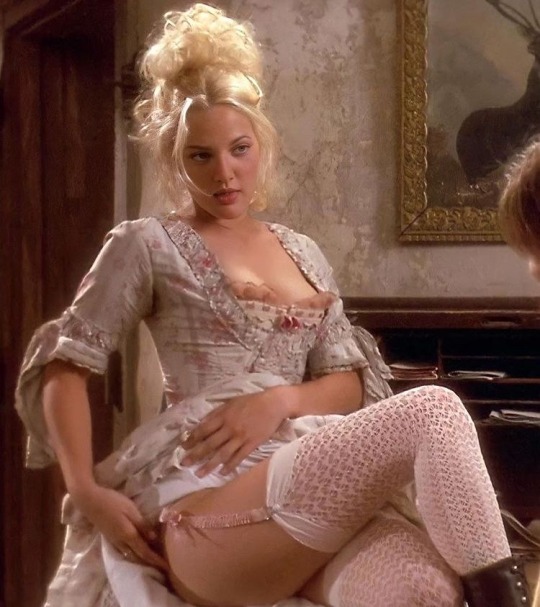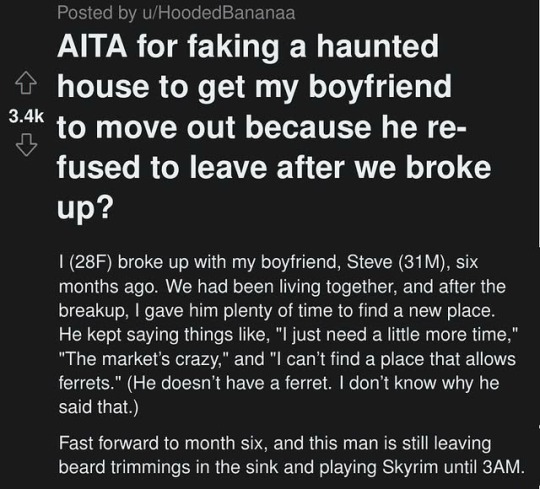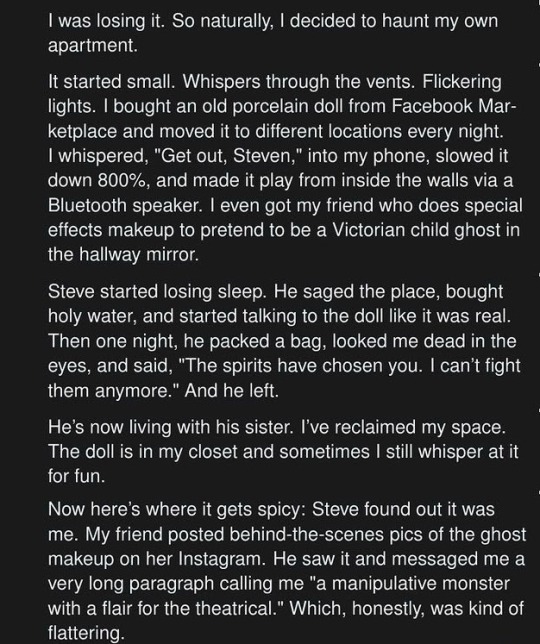K✨36✨ She/her.����🏳️🌈 18+ only✨ ✨Multifandom✨Requests OPEN👀💚💛💜❤️🩵🖤🩷🩶🤎💙🤍😈sideblog: pvssy-spanks-and-thanks
Don't wanna be here? Send us removal request.
Text
Writing Grief Without Romanticizing It
Grief is raw, messy, and deeply personal. It doesn’t follow a neat arc or fit into tidy narrative beats. While stories often use grief as a dramatic device, romanticizing it can cheapen the emotional reality. Writing grief authentically means embracing its discomfort and unpredictability, not sanitizing or idealizing it.
What Romanticizing Grief Looks Like
Characters who seem emotionally wrecked but always manage to look graceful in their suffering.
Overly articulate monologues that sound more like a eulogy than a real moment of loss.
Depictions of grief as a singular, cathartic event instead of a long, jagged process.
Romanticized Grief:
“Every day without you is like a piece of me fading away into a tragic, beautiful void. I’ll carry this pain forever, for it’s all I have left of you.”
This might be poetic, but it lacks the authenticity of how most people actually process grief.
Realistic Grief:
“I forgot your birthday. I didn’t mean to, but when I remembered, it was already too late. And then I hated myself because forgetting felt like erasing you.”
Writing Grief Authentically
1. Show the Physical Toll
Grief isn’t just emotional—it’s physical. Insomnia, headaches, exhaustion, or even the inability to move can be part of the experience.
“She woke up in the middle of the night again, choking on the air. Her chest felt like a cinderblock had been wedged inside, heavy and unmoving. It was three days since the funeral, and she still hadn’t slept longer than an hour.”
2. Let Grief Be Messy
Grief isn’t a perfectly linear journey. There’s no logical progression from denial to acceptance—there are setbacks, breakdowns, and even moments of denial long after healing has started.
“He yelled at his mother for throwing out the cereal box. ‘It was his favorite,’ he said. She didn’t remind him that it had been expired for months. She just handed him the trash bag and walked away.”
3. Avoid Glossy Sentimentality
Sometimes grief isn’t poetic; it’s ugly, blunt, and devoid of grandeur. Characters might lash out, shut down, or isolate themselves.
Romanticized: “I’ll cry every day, but I’ll keep going because you’d want me to.”
Realistic: “They said time would heal it. But it didn’t. Time just put more space between me and the life I knew before.”
4. Let Grief Manifest in Small, Unexpected Ways
Grief isn’t always about sobbing—it can show up in mundane moments: hesitating to delete a voicemail, holding onto an old sweater, or instinctively setting the table for someone who’s gone.
“She turned to tell him the joke, the one about the broken lamp, and stopped halfway through. The silence hit harder than the punchline ever would.”
5. Highlight the Absurdity of It
Grief can be absurd and disorienting. Characters might laugh inappropriately, obsess over trivial details, or feel disconnected from reality.
“At the funeral, all she could focus on was how crooked the flowers were arranged. She kept wanting to fix them. If she didn’t, she thought, none of this would feel real.”
6. Explore How Grief Changes Relationships
Grief doesn’t happen in isolation—it affects relationships, often in unexpected ways. Some people pull closer, others drift apart.
“Her friends stopped asking how she was doing after the first few weeks. She didn’t blame them; she didn’t have an answer. ‘Fine’ wasn’t a lie—it was just easier than saying, ‘I still can’t breathe when I see his empty chair.’”
7. Show the Longevity of Grief
Grief doesn’t end when the funeral does. Let it linger in your story, showing how it ebbs and flows over time.
“It had been five years, but she still called his number when something exciting happened. She didn’t know why. Maybe it was just habit. Or maybe it was hope.”
8. Allow for Moments of Respite
Grief isn’t constant agony. People still laugh, find joy, and go about their lives—sometimes feeling guilty for it.
“She smiled for the first time in weeks, and then immediately hated herself for it. It felt like betrayal, like forgetting.”
2K notes
·
View notes
Text
when i say “that reminds me” & theres zero connection you just have to take my word for it theres no time to explain
163K notes
·
View notes
Text

drew barrymore as lilly in “bad girls” (1994)
62K notes
·
View notes
Text
When it hits 9 pm and I pull out this combo:




Ps: I have severe writers block. Help
9K notes
·
View notes
Text

A mood board imagining the Garvez date as a rousing success.
14 notes
·
View notes
Photo


TED LASSO (2020 - 2023) Season 3 | Episode 9

729 notes
·
View notes
Text
It costs 0$ to Repost a Black disabled queer small business! It could lead to my next sale.
I sell pins, stickers, compression gloves, artist gloves, binders, wrist braces, compression socks, skorts, compression leggings & more!
Store details below!




176 notes
·
View notes
Text
me: this scene is stupid.
also me: writes it anyway and accidentally unlocks the entire plot.
4K notes
·
View notes
Text
Posture & Physical Presence For Writers
(Because how they stand can say more than how they speak.)
Upright and stiff — Formal, tense, or deeply uncomfortable. Slouched shoulders — Insecure, exhausted, or defeated. Relaxed stance — Open, comfortable, confident. Hands in pockets — Guarded, casual, or hiding something. Crossed arms — Defensive, cold, or waiting to be impressed. Leaning forward — Engaged, flirtatious, or impatient. Back straight, chin high — Proud, stubborn, or putting on a show. Shifting weight side to side — Nervous, indecisive, or stalling. Foot tapping — Anxious, impatient, or barely holding it together. Arms loose at sides — Neutral, calm, open to the moment. Fidgeting with sleeves/hair/etc. — Inner turmoil disguised as casual touch. Spine curled inward — Trying to be small, invisible, or unnoticeable. Standing too still — Suppressed emotion, discomfort, or internal freeze. Dominant stance (feet wide, chest forward) — Confidence, aggression, or showmanship. Head tilted slightly — Curiosity, confusion, or playful challenge.
4K notes
·
View notes
Text
Protip: if you live in a city, get involved in your local community. It will benefit your mental health significantly
6K notes
·
View notes
Note
I don’t seem to know how to write fic without being mean to the characters. There was a time when I could write fluff, non-angsty slice-of-life, and so on, but now I don’t seem to be able to tell a story without SOMETHING that hurts them.
I’ve had a lot of mental health issues in the intervening years, which I’m sure is related to the why, but doesn’t answer the what or how. It’s a problem because it’s led to me no longer being able to show my partners hardly any of my writing (a lot of dead doves hanging about, which isn’t something they can really stomach). It bothers me that I can’t share my creativity with people I care about.
Do you have any tips for lightening up, or where to find nice wholesome ideas that might spark some joy?
I don’t want to stop writing fucked-up stuff entirely, I just want to find my “nice voice” again.
*hugs* I get it, anon. Sometimes the things that we want to write aren't things we want to share - or at least, not with certain people.
I think a good first step to branching out from your current writing focus is considering what it is about this type of story that's appealing to you right now.
Do you want to make someone else experience a kind of pain or suffering that you've suffered? Pain is a lot easier to manage when you aren't doing it alone.
Do you want to feel a sense of control over someone else's fate? This can be a big comfort when you either didn't have control of your own or you feel as if control is currently slipping out of your grasp.
Do you want the catharsis of seeing someone survive the impossible? It can be extremely satisfying to watch someone claw their way out of the worst situation you can imagine. They get to be the hero in the end. They get to survive.
Do you want to feel a different kind of catharsis? Like the release of emotion that comes with a character's death? Whether they find peace in that moment or whether it's also a torment, it's still a release in the end.
These are just a handful of reasons why you might be writing these kinds of stories right now, and I'm glad you don't want to stop. They are important to you, and even if your partners don't have the same interest that's okay.
You might still be able to share your existing stories if you give your partners a version with the particularly dead doves removed and replaced with a summary, like [Character is tortured until they reveal the secret location. They are left beaten and barely alive.] Then they can pick the story back up after that point.
Of course, if you're writing shorter works then that might not be possible. One way to get back to "nicer" stories that are also on the shorter side could be to write hurt/comfort. You could still get some of what you need by hurting the characters, but then your partners would get the wholesomeness you're looking for when another character takes care of the one you've hurt.
I'll leave it here for now and open it up to ideas from the blog. I know how tough it can be when you want to share something you love with someone you love, and I hope we can get you back to being able to do that.
171 notes
·
View notes
Photo

30 Days of the CM Ladies | Day 8 | Thoughts on Elle Greenaway
Ahh, Elle. A character that the fandom seems to love to hate, because she is a “bitch”. I think a lot of this is based in (often internalised) misogyny, and because she doesn’t defer to Hotch in the end of her run. Shall we look at why? She was shot, in her own home. Her potential killer put his hand in her bullet wound to collect her blood and write on her walls. She was left to die. Soon after coming back, she is asked to go undercover and risk being attacked (raped) in her “home”. It’s worth mentioning at this point that the character background for Elle includes that she is a rape survivor, so while I understand people might not take that into consideration because there was never a chance for it to be made explicitly canon, I believe you can see it in her characterisation throughout her run. The people - Gideon and Hotch - who should know better than to put her in that situation, should know even if she agrees to or wants to do it it is the wrong thing, basically throw her to the wolves. She is triggered, and reacts badly. She then rectifies it in the only way she can, by murdering a rapist who she knows is otherwise going to continue to rape women. It does not excuse her actions or make them right, but it damn well explains them. I find it staggering that people judge Elle for this, but do not hold Hotch for the same standard, considering he beat an unsub to death with his bare hands under duress, even though Foyet was unarmed and surrendering (whether he really intended to or not). Female characters get attacked in fandom when they dare not to defer to Hotch’s superiority, Elle and Haley being the main ones demonised. Elle was put in an impossible situation by a man she trusted, and afterwards he didn’t take accountability for the part he had in what happened. She doesn’t back down to Hotch, and “fans” slander her because of deep-seated ideas of women “knowing their place” and/or being unwilling to accept that Hotch is an imperfect person. Elle is a character that fandoms are screaming for: a strong woman who does not require a man to hold her up, whose storylines are self-driven, and is more than a love interest. And yet fandom gives into their conditioning and hates her for exactly those reasons, because she doesn’t fit the very limited scope of what a woman should be.
80 notes
·
View notes










